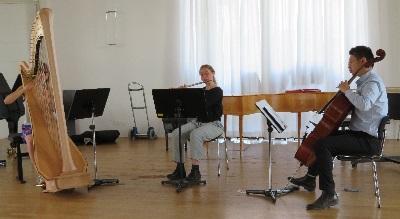
Johann Wilhelm Hertel (1727-1789), born in Eisenach, received violin and piano lessons from his father, the concertmaster Johann Christian, who is said to have been an excellent violinist and gambist. He worked from 1744 as court kapellmeister, first in Strelitz, later in Schwerin until his death. His works were highly esteemed in northern Germany during his lifetime, but he fell into oblivion after his death. He wrote a large number of symphonies, concertos for various instruments and harpsichord sonatas, as well as cantatas, odes songs and three oratorios. Praised are "a simple and natural melodiousness ... In the concertos one can observe ... an expansion of expression through the ever stronger inclusion of a passionate dramatic gesture." (MGG)
Carl Philipp Emanuel Bach (1714-1788). Johann Sebastian Bach's second eldest son is the main representative of musical Empfindsamkeit, the stylistic epoch between the Baroque and Viennese Classical periods. His compositional output encompasses numerous genres of instrumental music, including symphonies, chamber music, piano sonatas, works for solo instruments as well as sacred and secular vocal music of all genres. In 1738 Frederick the Great (then still Crown Prince) appointed him harpsichordist in the chapel at Ruppin. In 1741 Bach was permanently employed as a concert harpsichordist in the court chapel.
"He should not be called Bach (=creek), but Ocean," wrote Ludwig van Beethoven about Carl Philipp Emanuel Bach, "because of his infinite, inexhaustible wealth of tone combinations and harmonies."
Students of the classes Prof. Maria Stange (harp) and Kristian Nyquist (historical keyboard instruments)
Am Schloss Gottesaue 7 · 76131 Karlsruhe
Tickets
10 € · 5 € (red.)
at the known advance booking offices or →buy online
(Reservix charges handling and possibly shipping fees).